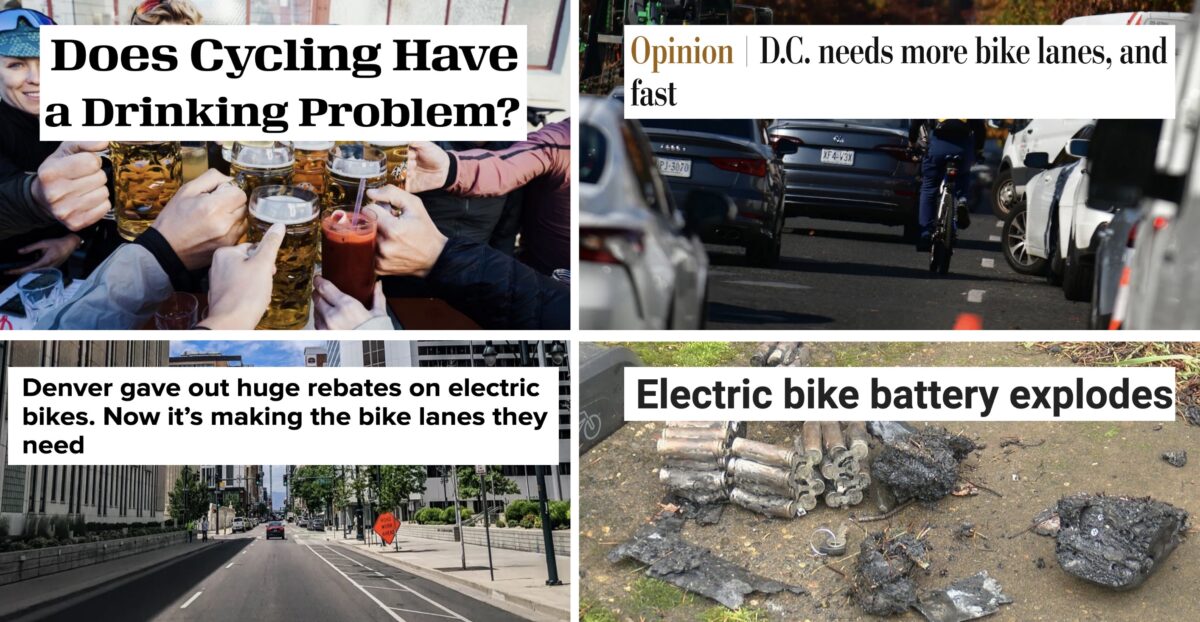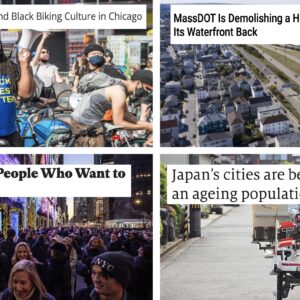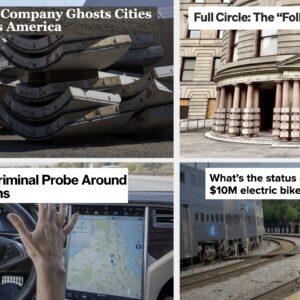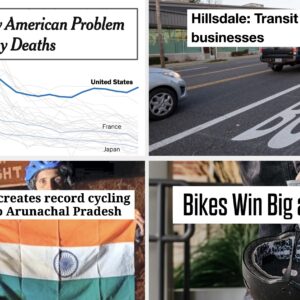Welcome to the week. And welcome to the new year!
Here are the most notable stories our writers and readers came across in the past week or so…
Cycling’s drinking problem: The prevalence of beer and alcohol in the cycling world is unhealthy and unnecessary says this excellent piece from America’s largest cycling publication. (Bicycling)
Transportation crystal ball: If you’re a big picture person who’s curious what a diverse range of experts thinks about where mobility trends are headed in 2023, you’ll appreciate this story. (The Verge)
Read it to the kids: Now there’s a children’s book to go along with the bike bus movement. (Manchester Ink Link)
The snowball’s chance: Essential reading on the Interstate Bridge Replacement project that makes it clear the project has a worrying amount of both momentum and uncertainty. (The Urbanist)
It’s the infrastructure, stupid!: Denver has stoked its rise of e-bike users so well that it’s now faced with the (welcome) challenge of making sure road designs keep them safe. (Electrek)
Good summar-e: This long-form piece touches on many aspects of the e-bike world from a New York City point of view. (New Yorker)
Portland influence: Yes we’ve lost a lot of our mojo in the past decade, but it speaks to the magic of Portland that this roundup of America’s top citizen activists is dominated by locals. (Streetsblog USA)
Like we’ve been saying: It’s wonderful to see a national media outlet come to the conclusion we’ve been trumpeting on here for many years now: That we’d be better off as a country if we focused more on EV-bikes instead of EV-cars. (NPR)
About those batteries: An electric battery from a Rad Power Bike that was plugged into a wall outlet blew up in Eugene. (KEZI)
“Pedal faster”: The editorial board of one of the nation’s most influential media companies has come to the conclusion that Washington D.C.’s transportation leaders need to build more and talk less when it comes to the implementation of quality bike infrastructure. (Washington Post)
Thanks to everyone who shared links this week.








Thanks for reading.
BikePortland has served this community with independent community journalism since 2005. We rely on subscriptions from readers like you to survive. Your financial support is vital in keeping this valuable resource alive and well.
Please subscribe today to strengthen and expand our work.
Cycling & Drinking
34 years ago I had the great good fortune to get “dumped” by the college buddies I drank with – Jan 1, 1989 is when I first got romantically involved with my life partner of the last 34 years. She had been going out (briefly) with one of the other guys (that’s how I met her) and the ultimatum was given – stop going out with her or don’t hang with them.
Obviously I chose her 🙂
As a result my drinking nosedived. Later I had to watch my brother – a former college X-Country runner, 1:10 half-marathoner and Cat 3 cyclist – destroy his body with alcohol:
By the time I got competitive w/cycling I was nearly a teetotaler – on multiday rides I’d always fare better than the guys who drank the night before.
Especially on the climbs 🙂
The bicycling piece is an example of how journalists without biomedical training often get the science wrong. First of all, the piece is misleading in that it uses relative risk to claim increased risk even when the results are not statistically significant. For example the piece cites an NCI report that refers to the following data from a systematic review of alchohol consumption and risk of several cancer types:
Secondly, by presenting relative risk percentages without context this piece exaggerates risk. For example, the non-significant “30% increase” in esophageal cancer relative risk in the piece is only a 0.11% increase in absolute risk.
PS: Don’t take my comment as being pro-alcohol consumption. My read of the literature is that anything above light drinking (0-7 drinks per week) may increase health risks.
Thank you Soren. I read it and noticed the same thing.
You’re spot on with the relative vs absolute risk reduction.
However, the p values in the table are for the heterogeneity of effects between subgroups (men and women). They are not about the overall dose-dependent cancer risk reduction. So the author did not get the science wrong.
Harald, you are correct that the figure is examining subgroup heterogeniety. Thanks for the correction but I think they still got the science wrong.
My guess is that the author obtained the ~30% value for esophageal cancer by using the 1.29 RR for esophageal SCC in case controlled studies (no significance reported) as none of the other RRs are close to that number. However, in the text and the figures the authors report no significant association between alcohol consumption and esophageal adenocarcinoma which represents ~80% of esophageal cancer cases in the USA. Ironically, for “light drinkers” the RR for esophageal AC in case controlled studies was 0.88 (CI: 0.74-1.04).
Well, so long as it’s “dry January” we might as well concern troll about alcohol. It is noted.
We are free to drink (or not). We are also free to speak and suggest the alternative.
That said, I would be stepping out of line to suggest that abstainers have a “problem.” Is this line not a shared boundary?
No.
Most choices are not purely black or white, they exist on a continuum, and moderation rather than complete abstention or immersion is always a third choice.
I agree, everything in moderation. Just about every form of food out there is “bad for you” in some way or another – alcohol, sugars & carbs (for diabetics), toxic metals, sodium (heart patients), gluten, and so on. Rice and chicken are apparently full of arsenic; spinach, carrots, and chocolate are loaded with lead and cadmium according to Consumer Reports; wheat has mercury, while lots of other foods are simply not studied in a similar way for toxins because everyone is worried about getting awful results – that basically our entire food supply is “bad for you” or suspected of being so. Apparently we as humans are set up to survive on various toxins, plastics and forever chemicals in our water, alcohol, carbs, and various other substances our distant ancestors didn’t consume, to live roughly 78 years or so. So have another piece of chocolate cake…
Are you asking that if it’s valid to say that drinkers, or some types of drinkers, have a problem, then it’s also valid to say that abstainers have one?
What is the concern trolling that you see happening?
At first glance, I thought the article about cycling and drinking was some kind of hit piece. I’ve definitely heard the argument that bike infrastructure “encourages drunk biking”. It was really eye-opening to read about the frat-boy drinking culture within cycling circles.
I got into riding a bike solidly from a transportation angle. In my eyes, it is primarily an energy-efficient, space-saving, and fun machine that I use to get around town. I never really “got” the sport side. It still seems kind of silly to strap a bike to a car and drive hundreds of miles to ride a few dozen. I get it though, you can’t mountain bike in the city.
However, the more time I’ve spent biking, I’ve had some really bad experiences with people in the “sport cycling” community. For one, there is the way that commuters are looked down at some bike shops. Like, if I don’t walk in with a fancy carbon road bike or if I ask really basic questions I get laughed out the door. I have heard from many women that they aren’t taken seriously at bike shops either – especially if they ride a commuter/cruiser bike. Thankfully Portland has a lot of shops that are ver welcoming. Not sure if I’m allowed to shout it out but Joe Bike is full of really friendly, helpful people and they service a wide variety of bikes.
I also have lycra guys buzz way too close on greenways and bike lanes. Sometimes they yell at me, sometimes not. As if riding to the grocery store in jeans means I’m “not a real cyclist”.
Finally, there’s the people who give public comments on infrastructure projects that say stuff like “I’ve been riding (mountain/road) bikes for 20 years and never needed a bike lane!” Because they don’t view bikes as practical transportation but rather fancy toys to use on the weekend.
Obviously sport cycling should continue to exist, but from the outside looking in it feels like there is a hugely toxic culture that really needs to be addressed. How many people have been turned off from biking in adulthood because of the toxicity many lycra guys and mountain bikers exude?